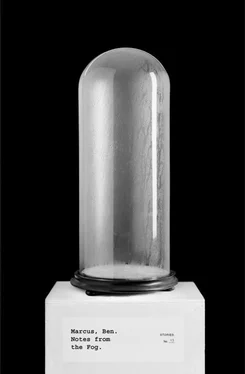It turned out that there was a woman at the school who did not die from seeing Carl up close, again and again. They had lunch together, and lunch together, and lunch and a walk, and a weekend coffee, and lunch again, until something felt wrong when they didn’t meet up, even if it was to do nothing much but take the woods path, or walk, once night had come on, right through town.
Her name was Maura, and she ran art and languages for the sixth graders. She asked what had happened to him, and he shook his head. He wanted to pull a long-story face. The hardened shell of him had withered by then, gone soft. It looked as if someone had died just outside his body and he was still wearing that person’s skin. He shook his head, that was all, and this was fine with her. She said she understood. Which meant, to Carl, that in one way or another maybe Maura was keeping to her own nondisclosure agreement, one that she’d struck with herself or others, sometime in the past, far from here.
It was no romance, which relieved them both. Maura and Carl were plain about what they needed to feel pleasure. If their intimacy could feel turn-based and a little like a chore, just friends bestowing favors, like old women doing each other’s hair, it was at least a manageable sorrow that he could endure. He could keep an eye on it and be sure that it didn’t grow.
Maura was older than Carl. She was kinder, finer-looking, more at peace, as far as he knew, with having been born. What a gift, not to be constantly scouting for an exit! And if Carl felt private or mean he knew to leave the house and pour out his cruelty in a safe place, where Maura could not be hurt. Perhaps what was most animal in him had been cooked out by Kipler and his rig, burned or boiled or just reduced so that it hardly ever appeared. He hated to think so positively, because he felt as if it did a kind of violence to his brain, but perhaps something good had come of all that heat, all that light. An off-script use case to the human grow light that no doubt they’d never suspect over at Mayflower: you could use that fierce power to eliminate the wrong and rotten parts of yourself. Not a grow light but the reverse, which felt better to Carl than he would have liked to admit.
—
It was probably notthe Lord who allowed Maura to conceive a child, even though she thanked Him. Carl tried thanking Him, too. His policy on the matter—as they tended her pregnancy all summer and into the fall, walking to school together on weekday mornings before silently parting for the day, then meeting again for the walk home—was that gratitude needed only to be released from one’s person, spoken out loud. From there, it could find its proper destination on its own.
When his son was born, on a cold, cloudless October night, Carl could not help himself. Some very old words came back to him. What a tremendously ridiculous person he’d become, even though nothing that had happened to him had been ridiculous. The words he recalled were somehow suddenly available, wanting out. He whispered them, over and over, until the little creature, still unnamed, mouth bubbling on Maura’s tummy, fell asleep for the very first time in his life: Someone new is among us. Someone special.
It hurt him to say this, because he was Carl. He knew the odds, the science, the facts. Or at least he used to. Was such a statement really as grossly untrue as it seemed? Just him being wishful, being scared? What, really, was so special about one more boy in the world?
Maybe the verdict on this could stay out for now. Just scattered into the distance, a verdict you could never really reach, even if you wanted to. Maybe, in whatever time he had left, Carl would work as hard as he could to keep the verdict on that question, along with every other question that pressed in, as far away from his family as humanly possible.
When George’s father died,he neglected to tell his therapist, which wouldn’t have been such a big deal, except for those killer moods of hers. She knew how to punish him with a vicious show of boredom.
He’d been deep in a session with her, maintaining that when he was younger he had discovered that there was no difference, in bed, between men and women. Literally. At the biological level. If you could wrap a present, you could make one into the other. And therefore this issue of preference had weirdly become moot. You didn’t have to check either box.
“Have you ever worked with clay?” he asked her. “Have you ever pushed pudding around in your bowl?”
George gestured to show what he meant. Spoon work, a bit of charade knitting.
Dr. Graco waved for him to get on with it.
It was finally, he explained, just a shame that there were no other categories he could sample.
“So you feel incapable of surprise at the sexual level?” she asked.
“I’m sure there are things out there I haven’t tried, but in the end they belong to categories that have washed out for me. Just, you know, haircuts I’ve already had, beards, whatever. There’s too much time left on the clock. I wish that I had paced myself.”
“Paced yourself?”
“Yeah.”
“Is it a race?”
“Yes. I just got my number. I should have pinned it to my shirt. Sorry about that.”
“You don’t take this seriously, do you?”
“Well… I pay you to take it seriously. Which gives me room to deflect and joke about it and put my insecurities on display, which you should know how to decode and use in your treatment. Another layer of evidence for your salt box.”
“Do you often think about how I conduct your treatment, as you call it?”
George sighed.
“I thought about it once, and then I died,” he said. “I bled out.”
—
And boom, the sessionwas over. He was in the waiting room putting on his coat before he remembered his news, what he’d been so determined to tell her, but he had to deal with the ovoid white noise machine which turned speech into mush, and the miserable young man waiting his turn who refused to ever acknowledge George when he burst out of his appointment. It was all a bit exhausting. Were the two of them really supposed to pretend that they weren’t both paying Dr. Graco to inhale their misery and exhibit a professional silence about it? And couldn’t they finally just unite in shame and even go sadly rut somewhere? Roll out their crusts against a building, even, or on the merry-go-round in Central Park?
Sex with sad people was something that could still deliver—in terms of sheer lethargy and awkwardness—but the demographics were stubborn. These people didn’t exactly come out to play very often. It wasn’t clear what birdcall you were supposed to use. You practically had to go around knocking on doors. And then the whole thing could verge on coercion.
The news of his father’s death had come in yesterday from a laundromat. Or perhaps it was simply a place with loud machines and yelling in the background. Someone was on the other end of the phone asking if a Mr. George was next of kin.
At first George was confused. “To what?” he asked. The word “kin” made him picture the Hare Krishna display, human beings going hairless and sleek as they evolved. As if a bald, aquiline man couldn’t swing a club and crush someone.
“All the tenants do a next of kin. I just need to know if that’s you. Tenant name is… I can’t really read this writing, to be honest. I didn’t know this man. We have a lot of units.”
George very slowly said his father’s name.
“That’s it. Check. And are you Mr. George?”
George said he was. Whenever someone tried to pronounce his true last name, it sounded unspeakably vulgar.
Читать дальше











